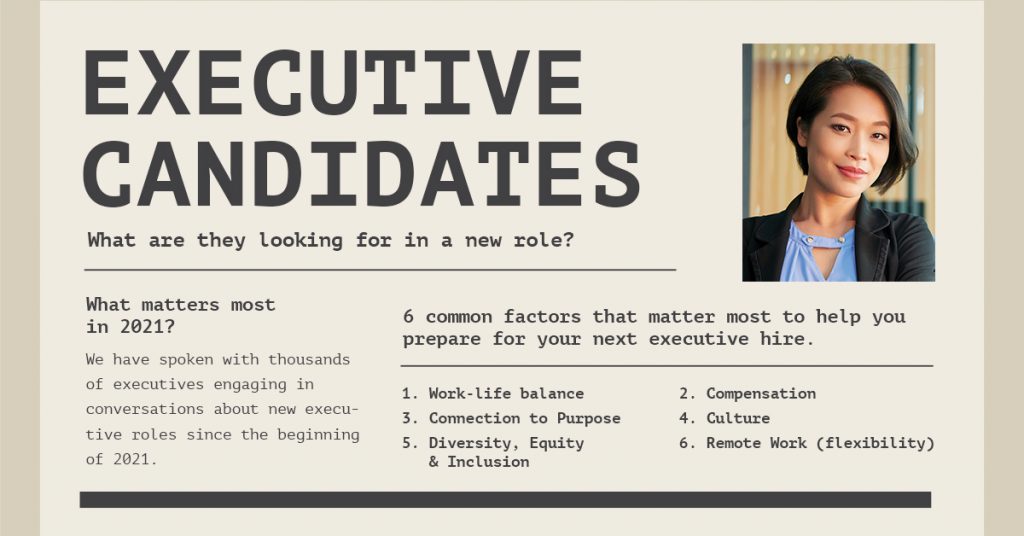What are Executive Candidates Looking for When Considering a New Role?
We have spoken with thousands of executives engaging in conversations about new executive roles since the beginning of 2021. We’ve compiled a list of 6 common factors that matter most to executive candidates to help you prepare for your next executive hire.

What matters most to executives considering a new role in 2021?
1. Work-Life Balance
Executives have high-pressure roles, expectations to succeed, and often need to work longer hours. Maintaining a strong work-life balance is important to their success, mental health and a happy home life.
When you are speaking with potential executive hires and promoting your open opportunities, making sure that you have a clear focus and intention on the importance of work-life balance for your executives will showcase your dedication to it and help to drive more interest in your roles.
2. Compensation
It is very difficult to compel an executive to leave their current role for less compensation. Especially with the current housing market and rising costs of life, lower compensation will cast doubt with potential executives and may result in them removing themselves from your search process. It is not impossible but if your compensation is not competitive it will limit your ability to attract top quartile talent.
Ensure that you research and analyze the current market for the roles you are looking to fill to ensure that you are providing competitive compensation to maximize your ability to headhunt from your competitors and other organizations hiring similar positions.
Executives are also looking for protection with their new contracts. We are seeing a lot more focus on severance clauses, breakdowns of what happens if there are conflicts in the relationship, etc. because of the risks involved with changing roles and organizations right now.
3. Connection to Purpose of Organization
The purpose and mission of your organization should be crystal clear in your messaging and when interviewing. What problem does your organization solve? What causes do you stand for? As a collective group what are you trying to achieve?
By using storytelling techniques you need to find ways to connect emotionally with potential hires and tell a compelling story that they will feel fulfilled and proud to work at your organization. Everything from your job descriptions, headhunting messaging, interviewers message should be consistent and tell the story of your organization.
4. Culture
Yes, although there are more remote executives and not all offices are back up and running from the pandemic culture still plays a critical role when it comes to assessing the fit for a potential executive. Executives are looking for security and stability, and want a culture that promotes that it is invested in each and every one of their employees. Executives are also looking for companies that have been able to continue a collaborative working culture even throughout the pandemic and remote workers. If they are considering a new role, they want to know that you aren’t leaving them on an island when they begin and that they have the support mechanisms to achieve success through collaboration.
5. Diversity, Equity & Inclusion
According to McKinsey’s research, companies with ethnically diverse leadership are 33% more likely to outperform on profitability and 21% more likely to have above-average profitability with gender diverse leadership teams.
Most executives know the role of diversity and inclusion and how it relates to their success and that of the organization. They want to know that diversity, equity and inclusion is at the forefront of the organization they are going to consider joining and that there is an action plan if improvement is needed. This will showcase to potential executive hires that you are serious about it and taking steps to address any issues.
6. Remote Work (Flexibility)
If the pandemic has taught us anything it is that having the flexibility to work remotely to alter your schedule based on personal circumstances (i.e. kids at home, at risk family members, etc.) is very important. It can relieve a lot of stress from executives and aid in their mental health and wellbeing.
Executives are looking for organizations that have a remote work policy in place. It’s 2021, if you do not have one yet, we suggest formalizing a policy to showcase your commitment to accommodating executives and their preferred working environments.
Preparation
Now that we have helped arm you with what is most important, make sure that you are properly prepared to speak to these considerations during the interview process to help you compel your ideal executive candidates to consider a role at your organization.

